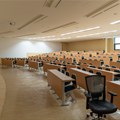While future-focused learning is gaining traction in South African schools, many students are still just “getting through the curriculum”, and finish matric inadequately prepared for life after high school, an education expert says.

Marion Kohler, principal at Abbotts High School JHB South (source:
LinkedIn)
“In an era of rapid technological advancement and evolving career landscapes, schools are at a crossroads. The traditional model of education, centred on rote learning, standardised tests, and a rigid curriculum, falls short in preparing students for the complexities of life after matric,” says Marion Kohler, principal at Abbotts High School JHB South.
Real world skills required
She says it is important for schools and educators to adopt a laser-sharp focus on equipping students with the skills, mindsets, and adaptability needed to thrive in the real world.
“Pivoting to ensure we are able to optimally prepare our students for life after school requires a bold reimagining of education which prioritises life readiness over mere academic compliance,” Kohler says.
The traditional education model primarily focuses on standardised testing and curriculum coverage, yet this approach no longer meets the needs of today’s students.
“Our focus as schools should not solely be on getting students through exams, but rather to equip students with the skills that they require to thrive in an unpredictable future. We must ensure that we teach students to take ownership of their learning, while nurturing self-discipline and accountability that serve them long after they leave our halls.”
This modern, student-centred approach is rooted in the belief that education should best equip students to navigate the complexities of the 21st century.
“A holistic education must integrate critical thinking, creative problem-solving, and emotional intelligence into the school’s academic framework, ensuring students are not only knowledgeable but also adaptable and resilient.
“Equally important to achieve – wherever possible – is high engagement and mentorship, which allow educators to nurture each student’s unique strengths, creating an environment where individuality is celebrated.”
Value of mentors
The American Psychological Association developed the APA Learner-Centered Psychological Principles that emphasise the importance of student engagement, and the critical role of teachers as facilitators and mentors. Effective learning environments are built on meaningful relationships where educators act as mentors, nurturing students through engaging instruction that promotes autonomy and motivation.
Kohler says the results of the above-mentioned approach are undeniable.
“At our school, the cohort of students who entered Grade 10 (when they choose subjects) in 2023 achieved more than a 20% average improvement by the time they finished matric at the end of 2025, demonstrating that high levels of teacher engagement, mentorship, and student motivation are powerful predictors of academic success.
“Students who learn how to manage their time, set goals, and approach challenges with confidence while at school, replicate this mindset outside school – exhibiting those soft and transferable skills which are in such high demand in the workplace.”
Kohler says flexibility also allows students to take charge of their academic journeys.
Setting
“An adult-like contemporary setting that mirrors the real world, where initiative and adaptability are key, can be of great benefit to students at high school level. The world no longer rewards those who simply follow instructions. Employers and universities seek individuals who can think critically, collaborate effectively, and take responsibility for their own growth.
“While circumstances are different at schools throughout the country, all schools can benefit from rethinking strict, curriculum-focused approaches that were traditionally relevant, but may no longer equip students for a changed present and future. We all need to consider how we can prepare students not just for exams, but for life.”



















